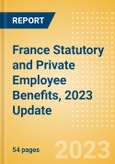The French social security system is comprehensive. It covers a wide variety of benefits such as healthcare, workmen's compensation insurance, family allowances, old-age pensions, disability pensions, and death benefits. Though the contribution made by employees and employers is huge, the French social security system is under severe financial strain due to the country's aging population, which has led to an increase in spending on healthcare and pensions. The country's social security budget is greater than its gross national product, which means that the cost incurred by the country for social security is more than the value of its domestic production.
Key Highlights
- The National Sickness Insurance Fund for Employees (Caisse Nationale d'Assurance Maladie des Travailleurs Salariés-CNAMTS), The National Old-Age Insurance Fund (Caisse Nationale d'Assurance Vieillesse-CNAV), The National Family Benefit Fund (Caisse Nationale des Allocations Familiales-CNAF), and The National Union for Employment in Industry and Trade (Union Nationale pour l'Emploi dans l'Industrie et le Commerce-UNEDIC) organizations are responsible for the functioning of the overall social security system.
- A person's national insurance contribution is determined based on their income.
- An insured person who is unemployed or unable to work and whose benefits have been exhausted is entitled to a credited contribution.
- In France, employers provide voluntary retirement benefits to their employees through Group Insurance Plans (Plan d'Epargne Retraite Entreprise-PERE) and Retirement savings plans (Plan d'épargne retraite-PER) plans.
Scope
This report provides a detailed analysis of employee benefits in France:
- It offers a detailed analysis of the key government-sponsored employee benefits, along with private benefits
- It covers an exhaustive list of employee benefits, including retirement benefits, death in service, long-term disability benefits, medical benefits, workmen's compensation insurance, maternity and paternity benefits, family benefits, unemployment, Long term care, minimum resources, leaves and holidays and private benefits
- It highlights the economic and regulatory situations relating to employee benefits in France
Reasons to Buy
- Make strategic decisions using in-depth information related to employee benefits in the country
- Assess employee benefits of the market, including state and compulsory benefits and private benefits
- Gain insights into the key employee benefit schemes offered by private employers in the country
- Gain insights into key organizations governing employee benefits market, and their impact on companies








